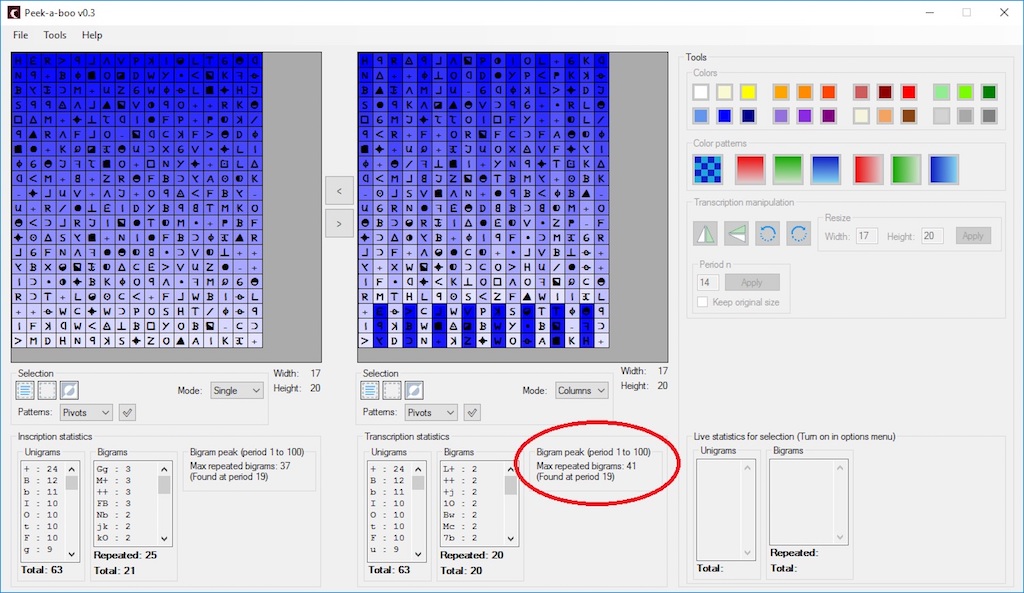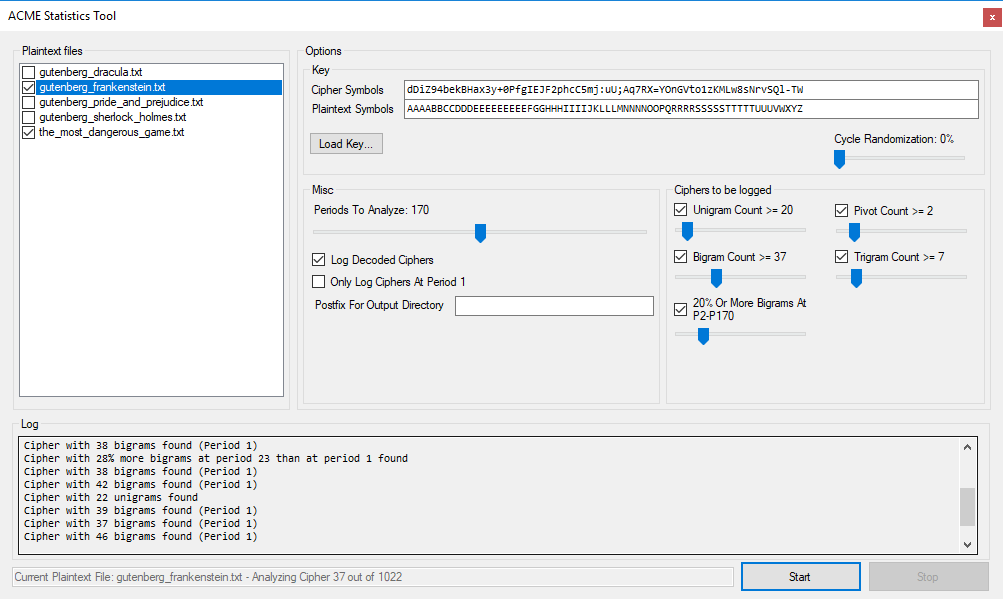ok I have it loaded and am up and learning the programme. yay for me.
what I would like to see is something like the Pattern drawer programme.
I have uploaded a new version. I hope you find it useful.
New features / Bugfixes:
- Added a dropdown for pattern selection. It contains primes and pivots (wrapped around pivots are also considered)[/*:m:17cfepgp]
- Added a tooltip when hovering a letter. Shows x, y and index (for both grids)[/*:m:17cfepgp]
- Added zodiac 340 font. I have used my own since the one from zkdecrypto did not work for me.[/*:m:17cfepgp]
- Added an options menu.[/*:m:17cfepgp]
- Each time you apply a transposition/other manipulation, period 1 – period 100 is calculated for the new cipher. Best result is show in the statistics[/*:m:17cfepgp]
- New selection modes: Single, Columns, Rows.[/*:m:17cfepgp]
- Added row/column shifting[/*:m:17cfepgp]
- Selection is faster now. Invert selection is not sluggish anymore.[/*:m:17cfepgp]
- Various improvements and bugfixes[/*:m:17cfepgp][/list:u:17cfepgp]
- Click anywhere into the right grid and press ctrl-A or the "select all" button.[/*:m:17cfepgp]
- Apply a blue gradient (top to bottom)[/*:m:17cfepgp]
- Choose "Mode: Columns"[/*:m:17cfepgp]
- Select every second column by ctrl-clicking them, starting with the second one[/*:m:17cfepgp]
- Shift the selection -3 by pressing three times the arrow-up key[/*:m:17cfepgp]
- Have a look at the bigram peak at the transcription statistics: 41 at period 19.[/*:m:17cfepgp][/list:u:17cfepgp]
ok I have it loaded and am up and learning the programme. yay for me.
what I would like to see is something like the Pattern drawer programme.
Pattern drawer is definitely on my todo list. But first I have to think about how to realize it. It should be convenient to use.
Also, row and column period operations are a must have. It is the period operation applied on the rows or columns order.
Nice idea. I put that on my todo list.
Please read before trying the update:
The new font is designed to work with my own transcription of z340. If you load other ciphers than the default one, the symbols will not match. You can turn off the font in the options menu.
To shift rows/columns you have to activate "colums", respectively "rows" selection mode. The selected rows/columns can be shifted by tapping the arrow keys. Keep in mind that you can select multiple rows/columns by ctrl-clicking. Jarlve, I think this is the feature you requested (you called it "offset controls").
By using my tool I found some interesting results. Here is one example (I will post the other results later in a separate thread):
Don’t know what to do with that result yet. But if you shift the rows a bit after apply period 19 you will get 46 repeated bigrams. A bit strange…at least to me =)
Download: https://www.dropbox.com/s/dp426bzin0xbhbe/Peek_a_boo_v0_3.zip?dl=0
PS: I have removed the old download links.
largo, great work, is it possible to have a feature to turn on and off the highlighted pivot schemes.
it would be interesting to see what the pivots are doing on your last period 19 row shift
edit.. i have just seen the pivot switch.
it would be interesting to see what the pivots are doing on your last period 19 row shift
Just select the pivots in the left grid an apply a color on them. Now you can track them
Very nice update Largo. Really liking it.
As always I have a few suggestions,
– You can copy-paste the grids into AZdecrypt for example, though sadly it inserts a tab between each character.
– Patterns: Pivots is real handy, could you add Pivots L=2, Pivots L=3, Pivots L=4?
– Bigram periods should go all the way up to 339 (cipher length minus one). If speed is an issue try my fastbigrams function.
– When in Mode: Single it is not possible to offset the grid in a linear fashion.
linear offset: 123 456 789 into 234 567 891 function m_fastbigrams(array()as integer,byval l as integer,byval s as integer)as integer dim as short i,score,id(s,s) for i=1 to l-1 s=array(i) l=array(i+1) if id(s,l)=0 then id(s,l)=1 else score+=1 end if next i return score end function
Don’t know what to do with that result yet. But if you shift the rows a bit after apply period 19 you will get 46 repeated bigrams. A bit strange…at least to me =)
Yeah, there are a couple of these simple operations which increase bigrams at period 19. For instance, select all columns and then apply a mere +1 column right-shift + period 19 will yield 45 bigrams. doranchak found this one, column period 2 + period 18 yields 44 bigrams.
We have yet to find out if this could be considered normal behaviour, for now I feel that it may be some kind of feature of the 340. The simplest explanation would be that it is what it is, though these operations have not produced a solve. Possibly there is some correlation with diagonal transposition.
Offset column order 1: 45 <--- Offset column order 2: 40 Offset column order 3: 36 Offset column order 4: 35 Offset column order 5: 35 Offset column order 6: 35 Offset column order 7: 33 Offset column order 8: 34 Offset column order 9: 36 Offset column order 10: 35 Offset column order 11: 38 Offset column order 12: 37 Offset column order 13: 37 Offset column order 14: 37 Offset column order 15: 33 Offset column order 16: 34 Offset column order 17: 37 Period column order 1: 37, 37 Period column order 2: 35, 44 <--- Period column order 3: 38, 37 Period column order 4: 33, 31 Period column order 5: 33, 32 Period column order 6: 37, 38 Period column order 7: 34, 31 Period column order 8: 35, 31 Period column order 9: 44, 35 <--- Period column order 10: 37, 33 Period column order 11: 35, 37 Period column order 12: 35, 31 Period column order 13: 34, 34 Period column order 14: 32, 32 Period column order 15: 32, 31 Period column order 16: 32, 35
I’ve uploaded a small update:
- New Feature: Bigram and Trigram coloring. Select "Patterns -> Bigrams/Trigrams" to highlight them. The colors will be more distinct in the next update.[/*:m:188lutbb]
- New Feature: Transcriptions: There is a new drop down which offers some basic transcriptions. It works for the whole cipher, not for selections. A bit experimental at the moment. Try "Columns: Odd before even" and then period 18 for example. Nice results. No solution though =)[/*:m:188lutbb]
- The statistics now also contains trigrams[/*:m:188lutbb]
- Bigram/Trigram peak detection now ranges from period 1 to period length-1[/*:m:188lutbb]
- Bugfix: No more tab stops in copied cipher. You can copy the whole cipher or a selection and paste in e.g. into AZDecrypt.[/*:m:188lutbb]
- Minor bugfixes[/*:m:188lutbb]
- A lot of internal changes and refactorings. I hope there are no new bugs
 [/*:m:188lutbb][/list:u:188lutbb]
[/*:m:188lutbb][/list:u:188lutbb]
You can find the download link in the first post of this thread
Thanks for the update to your nifty program Largo!
doranchak found this one, column period 2 + period 18 yields 44 bigrams.
Try "Columns: Odd before even" and then period 18 for example. Nice results. No solution though =)
Oops. Thats the same, sorry. So my "discovery" is nothing new.
Since I am checking some hoax ideas at the moment I needed some new features in my tool "peek-a-boo". The new features are:
- Grids can be filled with repeated sequences now[/*:m:1znyd13b]
- Encode / Decode (cyclic + random) dialog + load, save and edit keys[/*:m:1znyd13b]
- Diagonal transpose+untranspose. You can choose between 16 variations (alternating reading directions too).[/*:m:1znyd13b]
- Bugfixes, small improvements[/*:m:1znyd13b][/list:u:1znyd13b]
See first post in this thread for the download link.
See this link for some recipes to create pivots: http://zodiackillersite.com/viewtopic.php?f=81&t=3394
Nice update Largo. I tested the encoder and diagonal transposition, the icons representing the reading directions are really neat.
Hello,
I have extended "peek-a-boo" and added a statistics tool. You can reach it under "Tools -> ACME Statistics Tool". With this tool large amounts of text can be encrypted and compared indirectly with z340. The functionality is currently limited to the basiscs, but it will be extended soon.
Just put some larger text files (e. g. free books from Project Gutenberg) in the directory "Plaintext Source". In the tool you can now select these files and set the desired statistics options. I think these are self-explaining. If not, feel free to ask. The tool then filters all characters except A-Z and creates 340-character blocks, which it encrypts with the specified key.
After the analysis has finished, you will find the results in the "Logs" folder.
PS: The tool is still in beta phase. So don’t rely on the results.
@Smokie: I also added an option to export transpositions from the main tool as .csv which can be imported into Excel. Maybe this is useful to you.
However, it is vital that you match the ioc of the 340 if you want to do meaningful comparisons. Your cipher has a raw ioc of 1857 while the 340 has 2237. A higher ioc means more bigrams and lessens the chance of outliers.
I will extend the statistics, taking into account the IOC. However, I am not quite sure how to proceed. I am aware of what the IOC means, but I still have to learn a bit more first.
See first post in this thread for the download link.
Please let me know if you find bugs or if you have feature requests.
Have fun experimenting!
Very nice additions, Largo! Thanks!
Nice update Largo. Could you add one book to the download?
I did a small sample test with my plaintext library:
Plaintext 1 to 100 into homophonic substitution (target raw ioc: 1857) into period 17 transposition (as randomization): average p1 bigrams: 15.97.
Plaintext 1 to 100 into homophonic substitution (target raw ioc: 2237) into period 17 transposition (as randomization): average p1 bigrams: 20.69.
Almost a jump of 5 bigrams. As stated before, I regard the ioc as a value that approximates the repeat potential of a text where a higher ioc will generally have more repeats. Be that unigrams, bigrams etc, it affects all measurements and needs to be taken into account primarily when comparing stuff.
My encoder has a simple hill climber to target specific ioc values. It swaps the amount of homophones per letter around. That is one way to do it.



